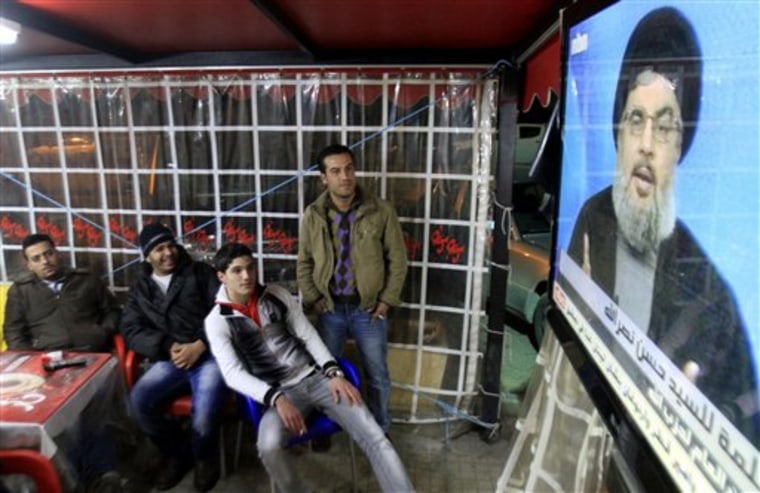A U.N. tribunal filed the first indictment Monday in the assassination of former Lebanese Prime Minister Rafik Hariri, touching off a process many fear could ignite new bloodshed nearly six years after the massive truck bombing along Beirut's waterfront.
The contents of the draft indictment were not revealed and may not become public for weeks as Belgian judge Daniel Fransen decides whether there is enough evidence for a trial.
The indictment, confirmed by the international court's headquarters in the Hague, is the latest turn in a deepening political crisis in Lebanon, where Hezbollah toppled the Western-backed government last week in a dispute over the tribunal.
The court is widely expected to accuse members of Hezbollah of being involved in the killing, something the Shiite militant group has insisted it will not accept.
The Iran- and Syria-sponsored group fiercely denies any role in the killing and says the tribunal, jointly funded by U.N. member states and Lebanon, is a conspiracy by Israel and the United States.
Many fear the crisis could lead to street protests and the kind of violence that has bedeviled this tiny Arab country of 4 million people for years, including a devastating 1975-1990 civil war and sectarian battles between Sunnis and Shiites in 2008.
Prime Minister Saad Hariri — the son of the slain leader — has refused Hezbollah's demands to renounce the court, prompting 11 Hezbollah ministers and their allies to resign on Wednesday.
The move brought down the unity government and further polarized the country's rival factions: Hezbollah with its patrons in Syria and Iran on one side, and Hariri's Western-backed bloc on the other, with support by the U.S. and Saudi Arabia.
The U.S. has called Hezbollah's walkout a transparent effort to subvert justice.
On Monday, Foreign Minister Ali Shami cautioned the U.S. to stop meddling in Lebanon. He summoned American Ambassador Maura Connelly to explain her weekend meeting with Nicolas Fattouch, a key undecided lawmaker, as politicians scramble to form a government.
After Monday's meeting with Shami, Connelly's office denied any interference.
"She explained to the foreign minister that the United States Embassy has regular contact with personalities from across Lebanon's political spectrum as part of its diplomatic mission," an embassy spokesman said. "The United States does not interfere in Lebanon's internal political matters. The shape and composition of the government is, of course, a Lebanese matter."
The Foreign Ministry's admonishment came as leaders from Turkey, Qatar and Syria met in Damascus to discuss the crisis. Lebanon had planned to hold its own talks starting Monday, but postponed them for a week as the regional leaders tackle the crisis.
Lengthy negotiations lie ahead between Lebanon's factions as they attempt to build a new government.
According to Lebanon's power-sharing system, the president must be a Christian Maronite, the prime minister a Sunni and the parliament speaker a Shiite. Each faith makes up about a third of Lebanon's population of 4 million.
Hariri, a Sunni, is staying on as a caretaker prime minister as a new government is formed.
The leader of Hezbollah on Sunday defended the decision to bring down Lebanon's government, saying his movement did so without resorting to violence. The speech by Sheik Hassan Nasrallah — who commands an arsenal that far outweighs that of the national army — appeared aimed at reducing tensions at a time when many Lebanese fear another outbreak of civil conflict.
In an earlier speech, Nasrallah said the group "will cut off the hand" of anyone who tries to arrest any of its members.
After Rafik Hariri's assassination, suspicion immediately fell on neighboring Syria, since Hariri had been seeking to weaken its domination of the country.
Syria has denied having any role in the murder, but the killing galvanized opposition to Damascus and led to huge street demonstrations helped end Syria's 29-year military presence.
Since then, speculation has grown that Hezbollah will be indicted. Though the tribunal has not yet named any individuals or countries as suspects, Nasrallah has announced that he expects members of his group to be indicted.
A May 2008 report by Germany's Der Spiegel magazine said the court will indict Hezbollah members based mainly on the analysis of mobile phone calls in the run-up to Hariri's assassination. One of the suspects made the mistake of calling his girlfriend with one of the phones, revealing his identity. The report also linked the explosives and the truck used in the attack to the Shiite militant group.
As Nasrallah spoke late Sunday, a local television station close to his movement aired what it said was leaked testimony from the tribunal.
In one of the tapes dating to 2007, Hariri is heard telling a U.N. investigator that he believed Syrian President Bashar Assad was personally involved in his father's assassination.
He also describes Assad as an "idiot" — a revelation that comes at a sensitive time when Hariri has been trying to repair his relations with Syria.
Hariri's office acknowledged the tapes are authentic but said they were taken out of context.
___
AP Writer Mike Corder contributed to this report from Leidschendam, Netherlands.
